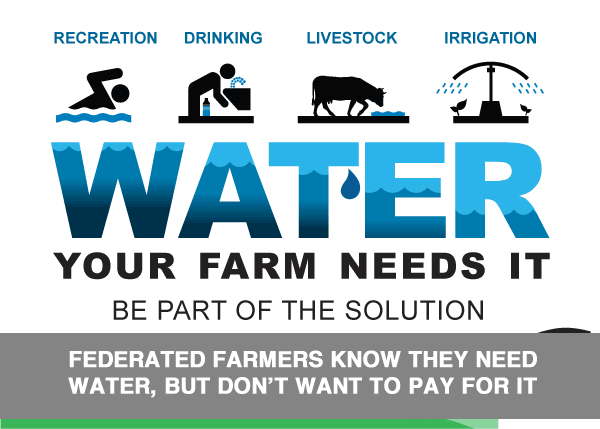On Wednesday Labour released its freshwater policy. In short they aim to have all rivers and lakes swimmable, fishable and suitable for food gathering by 2025. As part of their plan to achieve this, Labour would also put a price on water used by irrigators.
The Labour proposal was swiftly rejected by Irrigation New Zealand (no surprise there) and dismissed as “stupid, unrealistic, and unfair” by Federated Farmers. Even the Minister for the Environment put the boot in, calling it a “thinly-veiled attack on rural New Zealand” because they were imposing a tax on rural New Zealanders that no one else would have to pay.
First up let’s look at the aspiration for swimmable rivers and lakes. As set out in yesterday’s blog, the claims about cost are really scaremongering. This is an aspiration – the cost depends on how long it takes to get there. Sure, if we want all rivers swimmable tomorrow the cost would be huge. But as an aspiration the only real cost is keeping a closer eye on the number of activities that can increase pollution (like dairy conversions). It is clear that most Kiwis want to see a trend toward better water quality. Besides, the Government’s policy already includes exceptions – and their aspiration is solely to have waterways we can wade in without melting our gumboots.
The issue of the irrigation charge is a bit more complex. On the one hand, Labour is acknowledging that sorting out fresh water (even with the Government’s lowly ambitions) will take money. On the other hand, Labour is wrong to single out irrigation as the sole target for a water charge. Labour’s response is only a part of the picture – wholesale reform is needed.
Let’s start by dealing with the responses of the lobby groups to charging, which should be seen as pure, unadulterated self-interest and nothing to do with national interest. Federated Farmers is yelping that it’s unfair for farmers to pay for the use of irrigated water. But the lobby group doesn’t seem to think it’s unfair at all that farmers have despoiled the waterways, affecting all New Zealanders. Certainly, farmers haven’t been the only cause of our water woes. But to think improving water quality is an attack on farmers without acknowledging that polluting waterways is an attack on all New Zealanders is hypocrisy at its worst. Do Fed Farmers think that their members are a higher form of New Zealander? Its self-serving assault on the national interest requires remedial correction.
Should we charge for fresh water? The answer is yes, but why stop at the irrigators? The reality is that freshwater is in limited supply and is far outstripped by demand. Further, some users return the water they take to the waterway in a polluted state, others just pollute, and others compromise the water quality by impeding the flow. The solution is obvious, all water users have to be charged and polluters of waterways also have to be charged. The revenue funds the maintenance and improvement of water quality. Otherwise the public either has to pay to clean up the mess, or we just let the mess pile up.
This is simply acknowledgement that freshwater is a resource of value – so let’s establish what that value is, using the market. Water use rights (and pollution rights) once allocated should be tradable. Once we have fixed limits on water use and pollution, they could be traded so that they are both used in the most efficient way possible. That means the country can get the maximum amount of economic return from a given level of water use and pollution. The next implication of this reality of course is that freshwater is a natural resource and therefore under Article 2 of the Treaty, Maori have ownership rights.
There will be objections like those below, from freeloaders like those who fund Fed Farmers:
- “No one owns rivers” or “We all own rivers” – Get real. Businesses are using the water in our rivers already. They have resource consents.
- “Pollution shouldn’t be traded” – pollution is happening already. Why don’t we get the maximum economic benefit from it?
- “The Emissions Trading Scheme has failed” – Well yes it has, because there was no effective cap on emissions, and constant political interference sent the price through the floor. That is a design fault, not a problem with market mechanisms.
The path we’re on at present – to regulate users and establish elaborate bureaucracies to try and balance the public interest with those of private profit seekers – is fraught with difficulty and almost impossible to arrive at an efficient and equitable outcome. Far better to unleash market forces in this sector by establishing joint State/Maori ownership of the resource, allowing trade of water use rights and then charge all users of our water and polluters of our waterways. Such an approach will not only be more economically efficient in the long run, the sooner it’s introduced the sooner it will prevent over-investment in water-intensive industries that to date do not pay anything like what the water is worth to other users. And best of all it would create a source of revenue for us to invest in cleaning up our rivers, so all New Zealanders win.
The effective subsidy from New Zealanders to the paymasters of Fed Farmers in the form of “free” fresh water may well have led to a gross over-investment in farming. Let the market rule and let’s see how viable some of its recent expansion really is.

